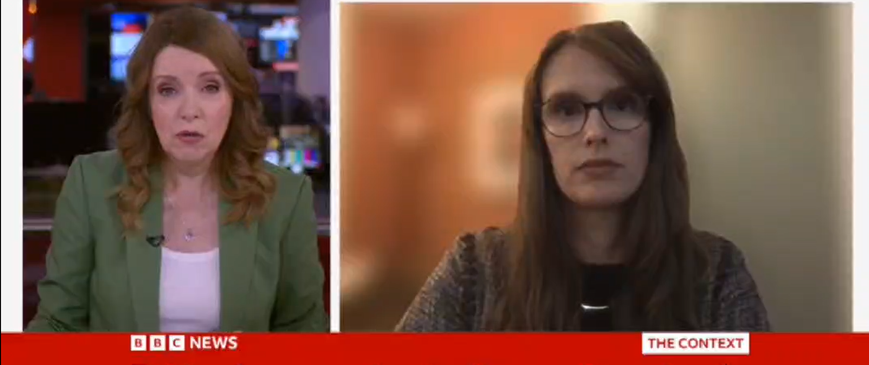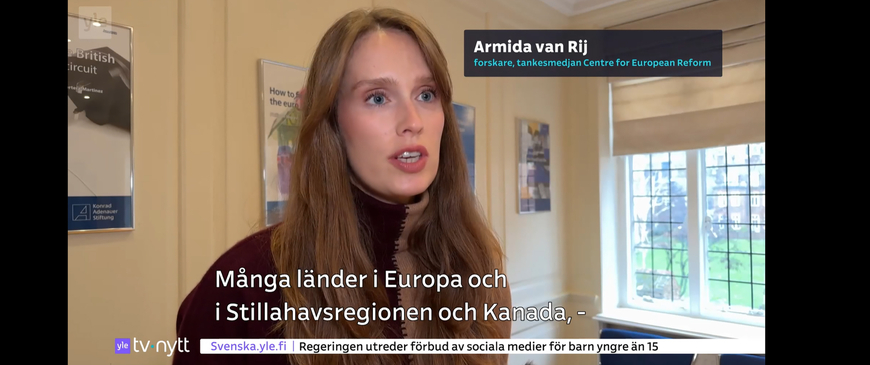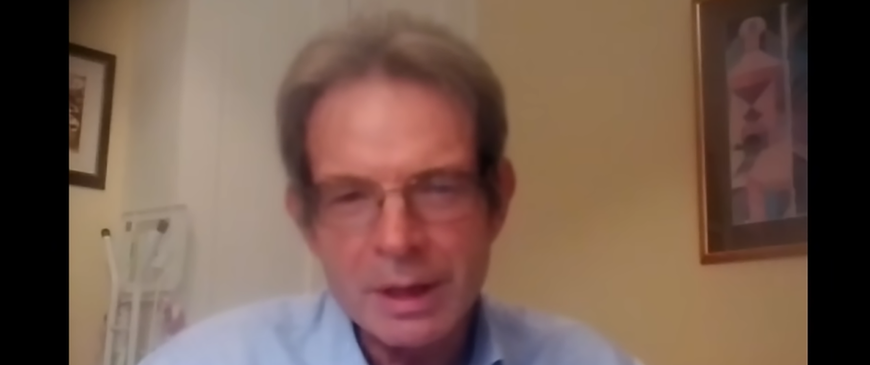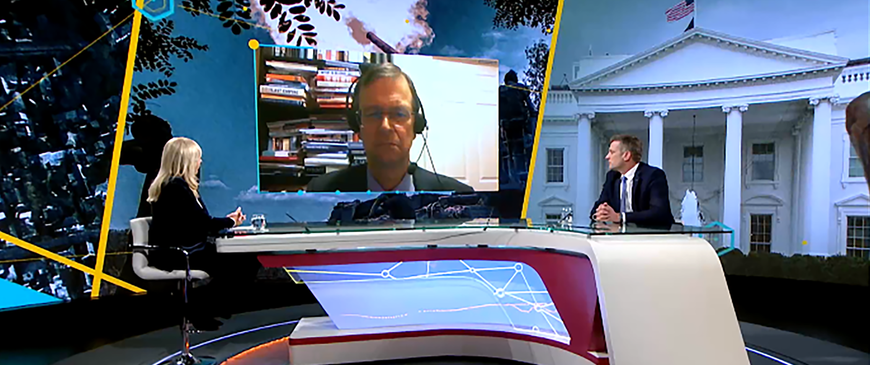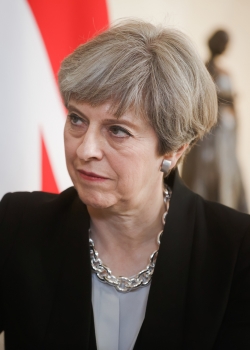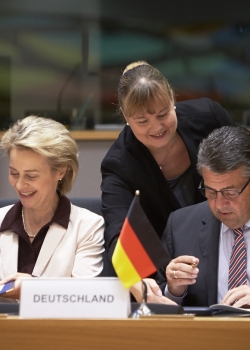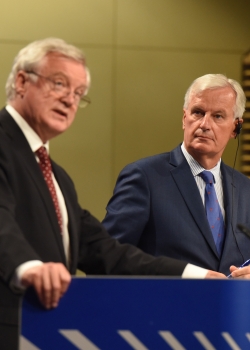Press
BBC Radio 4 - The World Tonight: Selmayr controversy
27 February 2018
Agata Gostyńska-Jakubowska, a senior research fellow at the Centre for European Reform speaks to Adam Fleming about Martin Selmayr and his new role (from 24:21 mins).
Tok FM: Corbyn opowiedział się za nową unią celną z UE. Jaką?
27 February 2018
Agata Gostyńska-Jakubowska speaks to Tok FM about Jeremy Corbyn's speech on Brexit and the customs union on 27th February 2018.
Brexit Britain will be a world leader again – but only if we ramp up military spending, top Tory warns PM
26 February 2018
The Sun
Tom Tugendhat was speaking at the launch of a report by The UK in a Changing Europe, which calls on a more rigorous approach to ensuring Britain’s security is not weakened by leaving the EU. During the event, Luigi Scazzieri of the Centre for European Reform warned that the UK must “invest more on security, diplomacy and development to maintain its influence” after Brexit.
Corbyn backing for customs union sets up showdown with May
26 February 2018
Bloomberg
“The speech was actually quite clever,” said Sam Lowe of the Center for European Reform. “He has made demands that are potentially resolvable within the existing EU single market framework, and de-prioritized freedom of movement, giving himself a lot of wiggle room. It’s in the EU’s interest to let this hang in the air for a while, whether they agree with all he said or not.”
Corbyn's customs union plan — what it might mean
26 February 2018
The Financial Times
But Charles Grant, director of the Centre for European Reform and a veteran Brussels watcher, suggests there may be some wriggle room.The “UK could achieve something like what Norway has when Schengen issues are discussed — a seat, a voice in relevant committees and ministerial councils, but no vote,” he tweeted on Monday.
Waiting for Putin and Assad to run out of people to kill. Is that our plan?
25 February 2018
The Observer
It has been a quieter than average week in Syria. More than 400 people were killed in the unimaginably awful siege of eastern Ghouta, most of them civilians.
Here is another bump in the Brexit road that Theresa May will survive
25 February 2018
The Independent
Charles Grant of the Centre for European Reform, who talks to continental Europeans, says “the EU would welcome a British decision to ask for a customs union”. If that is what it takes to get a deal, then I think Theresa May will do it. Just because she ruled it out – like last year’s early election – doesn’t mean it’s not going to happen.
Theresa May's moment to soften her Brexit stance
23 February 2018
The Financial Times
Twenty months after the Brexit referendum, the British government is inching towards working out what to ask for in its future relationship with the EU.
UK's hopes for post-Brexit trade deal an illusion – Donald Tusk
23 February 2018
The Guardian
Charles Grant, director of the Centre for European Reform think-tank, said the approach agreed at Chequers seemed to be the so-called baskets model, where the UK would align with the EU in some areas, have some alignment in others, and none elsewhere. “I think there’s no chance of the EU agreeing to the proposal,” he said. “The EU’s obsessed with the level playing field. It doesn’t trust any enforcement mechanism proposed by the British to police it adequately.”
May cannot lead on Brexit. Here’s Corbyn’s chance to seize the day
23 February 2018
The Guardian
According to Sam Lowe, trade analyst at the Centre for European Reform, what Britain is asking for is “institutionalised cherrypicking” – and no cherrypicking is the cardinal rule of the single market. Small wonder, then, that not long before the cabinet sat down to slow-braised Guinness short rib of beef, the European commission issued a document explicitly rejecting the three-basket approach. In light of that, “ambitious” is one way to describe the UK government’s approach. “Delusional” is another.
The big issues of Italy's election campaign in charts
23 February 2018
Financial Times
The centre-right coalition, including Silvio Berlusconi’s Forza Italia and Matteo Salvini’s Northern League, has been able to “ride a wave of discontent over the migration crisis”, according to Luigi Scazzieri of the Centre for European Reform. Italy has a relatively low immigrant population but the issue has become a top concern for Italians because of the flow of migrants arriving from across the Mediterranean.
Jacob's dream's crackers
23 February 2018
The Llanelli Herald
Was it just his imagination running away with him? Was there a ball of confusion instead of clarity? Whatever it was, Jacob Rees Mogg succumbed to the temptations of the television cameras in the House of Commons and gave an insight into the thought processes in the Brexiteers’ psychedelic shack.
Leaked docs show EU capitals considering trade deal with UK
22 February 2018
The Sun
Sam Lowe, from the Centre for European Reform, explained such a pact would involve fewer checks and less paperwork for British businesses but could not provide a silver bullet for all their concerns. He said: “In practice it would mean barriers still go up, but depending on some of our other choices UK products would be considered low risk so the frequency of intense checks would be low.”
Mission Impossible at Chequers
21 February 2018
The Financial Times
Charles Grant, head of the Centre for European Reform, highlights this thinking in a piece for Politico. He notes that the 27 are more divided on the future relationship than they were on the first phase of the Brexit talks.He says that some governments are uncomfortable with the hard line taken by the Germans, the French and the commission and point out that the UK’s trade with the EU is eight times that of Canada’s and that Britain and the EU will want a much closer relationship in areas like security, foreign policy and research. “This camp includes Sweden, the Netherlands, Denmark, Ireland, Portugal, Italy, Croatia, Hungary, Poland and possibly Spain.”
Tory MPs' hard Brexit letter to May described as ransom note
20 February 2018
The Guardian
Sam Lowe, a trade expert at the Centre for European Reform, told the Guardian: “A standstill transition is in everyone’s interest and absolutely essential if the government is serious about negotiating a mutually beneficial ongoing relationship between the EU and UK. In trying to undermine that the ERG are asking the government to sacrifice the economy on the altar of ideology.”
EU could demand freedom of movement after Brexit in return for going easy on bankers
20 February 2018
The Telegraph
But John Springford, deputy director of the Centre for European Reform, said the EU would treat Britain as harshly as Switzerland, which was forced to back down after a referendum demanded an end to free movement. The Swiss-EU agreement does not cover services, he added. “Most countries do not want to lose young, skilled people to the UK, as it erodes their tax base. And unless the UK signed up to free movement pretty much as it is now, the deal will be a much more limited Free Trade Agreement,” he told The Telegraph.
What defence policy for the next German government?
19 February 2018
E!Sharp
As they try to form a coalition government after last September’s inconclusive elections, Germany’s politicians are debating Germany's role in protecting Europe.
Of course we will strike a bespoke Brexit deal — but that's not the point
19 February 2018
Prospect
The government’s “Road to Brexit” series of speeches has kicked off, with Boris Johnson and the Prime Minister making contributions so far.
The Tony Blair Institute for Global Change - Podcast: A Germany special - politics and defence
19 February 2018
Shashank Joshi and Simon Tilford of the Tony Blair Institute for Global Change sit down with the Centre for European Reform's Sophia Besch to discuss the twists and turns of Germany's coalition talks, and the state of Germany's military.
Theresa May wants new security treaty with EU next year
17 February 2018
The Guardian
“Theresa May is right to warn against letting ideology get in the way of security,” said Sophia Besch of the Centre for European Reform. “But her message should be directed not just at the EU, she needs to say the same to Brexiters at home who categorically oppose the ECJ on ideological grounds.”

